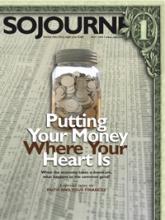The past several months have been marked by burgeoning financial anxiety in the U.S. and global markets, at the gas pump and grocery check-out, in corporate offices and at kitchen tables. As falling house prices and the subprime mortgage crisis have destabilized credit markets and stock markets, many financial experts seem as confused as the rest of us. New York Times economics columnist David Leonhardt wrote in March, admitting his own befuddlement, “Raise your hand if you don’t quite understand this whole financial crisis.” One gets the disconcerting feeling that many major market players were like toddlers chasing after bubbles floating on the breeze, suddenly stunned and surprised to realize that bubbles will burst.
Some of us feel great fear as retirement funds nosedive or house values plummet, those ephemeral numbers on computer screens or in newspapers creating real uncertainty about our future. Others are caught in the undertow of the mortgage crisis or of personal debt, losing homes and cars and more. Others only know that they seem to be working harder, but getting poorer.
In focusing this issue of Sojourners on faith and personal finance, we are not offering quick fixes for current economic woes—if they exist, they are outside our field of expertise. Nor do we suggest simple pieties about how Jesus will make everything better. As Christians, in a deep sense we do think Jesus makes everything better, but he rarely makes things simple.
Read the Full Article
